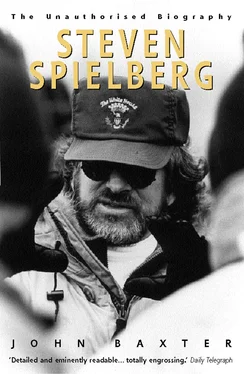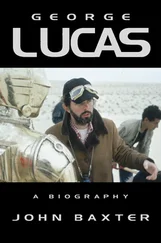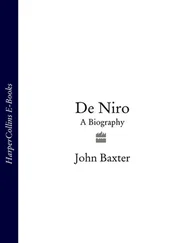Deciding what, if anything, Duel was ‘about’ became an intellectual game. Most American critics saw the film as pop sociology, and ammunition in the fight against their particular bêtes noires: mechanisation, alienation, pollution.
Europeans detected less symbolism and more craft. ‘With almost insolent ease,’ said Tom Milne in the British cinema magazine Sight and Sound , ‘ Duel displays the philosopher’s stone which the Existentialists sought so persistently and often so portentously: the perfect acte gratuite , complete, unaccountable and self-sufficient.’ Milne did, however, also note two themes which would later become Spielberg trademarks. One was the film’s roots in medieval chivalry, a preoccupation that would surface again in Indiana Jones and the Last Crusade . With the truck’s first swerve in front of Mann, ‘the gauntlet is down’, leading to ‘a simple mortal combat between hunter and hunted [with] the huge lumbering lorry as the dragon, and the glitteringly fragile Plymouth sedan as the prancing, pitifully vulnerable knight in armour’. Spielberg later admitted he’d seen it as a man ‘duelling with the knights of the highway’. Another theme was the opponents’ solipsistic isolation from the world. Mann and the driver hardly exist outside their confrontation. Action is their character, as it would be for the shark-hunters of Jaws , Roy Neary in Close Encounters of the Third Kind , and Indiana Jones.
Duel boosted Spielberg’s stock at Universal, especially among technicians, most of whom were on contract and depended on good word of mouth for their next job. They couldn’t care less about what critics said, but the kid took care of his people and made them look good. Two weeks after Duel aired, renegade producer/director Tom Laughlin signed cameraman Jack Marta to shoot his highly successful Billy Jack films. Editor Frank Morriss found himself being offered more features. Jim Fargo, the assistant director, would be picked up by Clint Eastwood and direct features for him. Some went on with Spielberg. The composer Billy Goldenberg would work on Amazing Stories when Spielberg produced his TV series at Universal in 1985. Many of the people on Something Evil would also figure in Spielberg’s later career, including cameraman Bill Butler and Carl Gottlieb, his old friend from Long Beach who has a small acting role in the film and would later appear in and co-write Jaws .
Universal received a dozen requests from other studios to borrow Spielberg for cinema features. To his frustration, they turned them down. Nor would they agree to let him do a feature for them. Instead, Levinson and Link snagged him for another pilot. Husband and wife Martin Landau and Barbara Bain were being relaunched after Mission: Impossible as investigating reporters Paul Savage and wife. No amount of protest would shift Sheinberg, and although Spielberg’s old friend Barry Sullivan played the Supreme Court justice whose blackmailing the Savages probe, the experience was humiliating. After much tinkering and some changes in title, from Watch Dog to The Savage Report , the film aired in March 1972 as Savage , to generally indifferent reviews. It was, Spielberg said later, the only time he was ever forced to make a film. But even this wasn’t enough for him to recant on his belief in consensus film-making.
After adding nine minutes to Duel , Universal sent it to Cannes in May, a curtain-raiser to its European cinema release. Spielberg went too, his first trip outside America. A friend snapped him on a rainy Paris afternoon scampering across the Place de l’Etoile, the Arc de Triomphe behind him, a lanky kid in flared jeans, square-toed boots, striped skinny-rib shirt and too-tight jacket. He stares around in awe. Paris! In July, in Rome, Spielberg asked the local Universal office to arrange lunch with Federico Fellini. Fellini agreed, and his publicist Mario Longardi went along to translate. To their astonishment, the American-style restaurant they chose in deference to his guest’s palate refused to seat them because Fellini wasn’t wearing a tie. The ‘maestro’ stormed out, shouting over his shoulder, ‘Now we go to an Italian restaurant.’ After lunch, Spielberg handed Longardi his camera and asked to be photographed with Fellini, demanding a number of re-takes, including one with his arm around the waist of a startled director. Spielberg later wrote saying that he had the pictures on display in his office, believing they brought him luck, but neither Fellini nor Longardi was convinced that this gauche kid would make it in the film industry.
The intellectual climate in Europe was just as uncongenial. In Rome, left-wing critics pressed Spielberg to endorse their reading of Duel as socialist parable: working-class truck v. bourgeois sedan. Four of them left noisily when he wouldn’t agree. He was no more ready to enrol in the avant garde . As a consensus film-maker, he couldn’t accept Cahiers du Cinéma’s politique des auteurs , which designated one single person on a film as its driving intellectual force. ‘Those directors who believe in the auteur theory will have coronaries at an early age,’ he told his Cannes press conference. ‘You can’t play all the instruments at once.’
Spielberg accepted all the compliments for Duel , even those absurdly at odds with his beliefs. Yes, it was an ‘indictment of machines’ – despite his passion for video games and electronic gadgets. And sure, Mann was a horrible example of how suburban life rots mind and soul – this from the archetypal enthusiast for suburban America. Talking to him after Jaws , Richard Natale would compare him to ‘a computer, constantly clicking, reeling out facts and figures about the movie industry like a ticker tape. He is already adept at giving the quotable quotes, at circumventing the wrong questions.’ He’d coax columnists, ‘Let’s call each other with gossip,’ and tell San Francisco alternative journalist Mal Karman, ‘If you need more stuff for your article, just make it up. I don’t care.’
Duel opened in London in October 1972, though in a cinema outside the West End, and destined for a fortnight’s run at most. But its reputation had been growing since Cannes. David Lean said, ‘It was obvious that here was a very bright new director.’ British critics, and in particular Dilys Powell, who described Duel in the Sunday Times as ‘spun from the very stuff of cinema’, reviewed it with such enthusiasm that Universal transferred it to the West End and printed a new poster plastered with their praise. It had a respectable, if not spectacular London season, but did better on the Continent. To François Truffaut, Duel exemplified all the qualities he and the other New Wave directors aimed for: ‘grace, lightness, modesty, elegance, speed’, without their shortcomings, ‘frivolity, lack of conscience, naīveté’. The film finally cleared $6 million profit, but, more important, launched Spielberg’s critical reputation, especially in London, a city that, despite his dislike of Europe, would increasingly become his second headquarters. In 1984 he told lain Johnstone, Powell’s successor at the Sunday Times , ‘If it wasn’t for your illustrious predecessor, I wouldn’t be here.’
Back in Hollywood, events were conspiring to free Spielberg from the Universal TV treadmill. By the advent of what Joan Didion called ‘the hangover summer of 1970’, the dismal box-office receipts of youth films had been assessed, and their makers were out. ‘Nobody could get past the gate without a commitment from Barbra Streisand,’ she wrote. Casualties of the collapse littered Hollywood. ‘All the terrific twenty-two-year-old directors went back to shooting television commercials, and all the twenty-four-year-old producers used up the leases on their office space at Warner Brothers by sitting out there in the dull Burbank sunlight smoking dope before lunch and running one another’s unreleased pictures after lunch.’
Читать дальше












